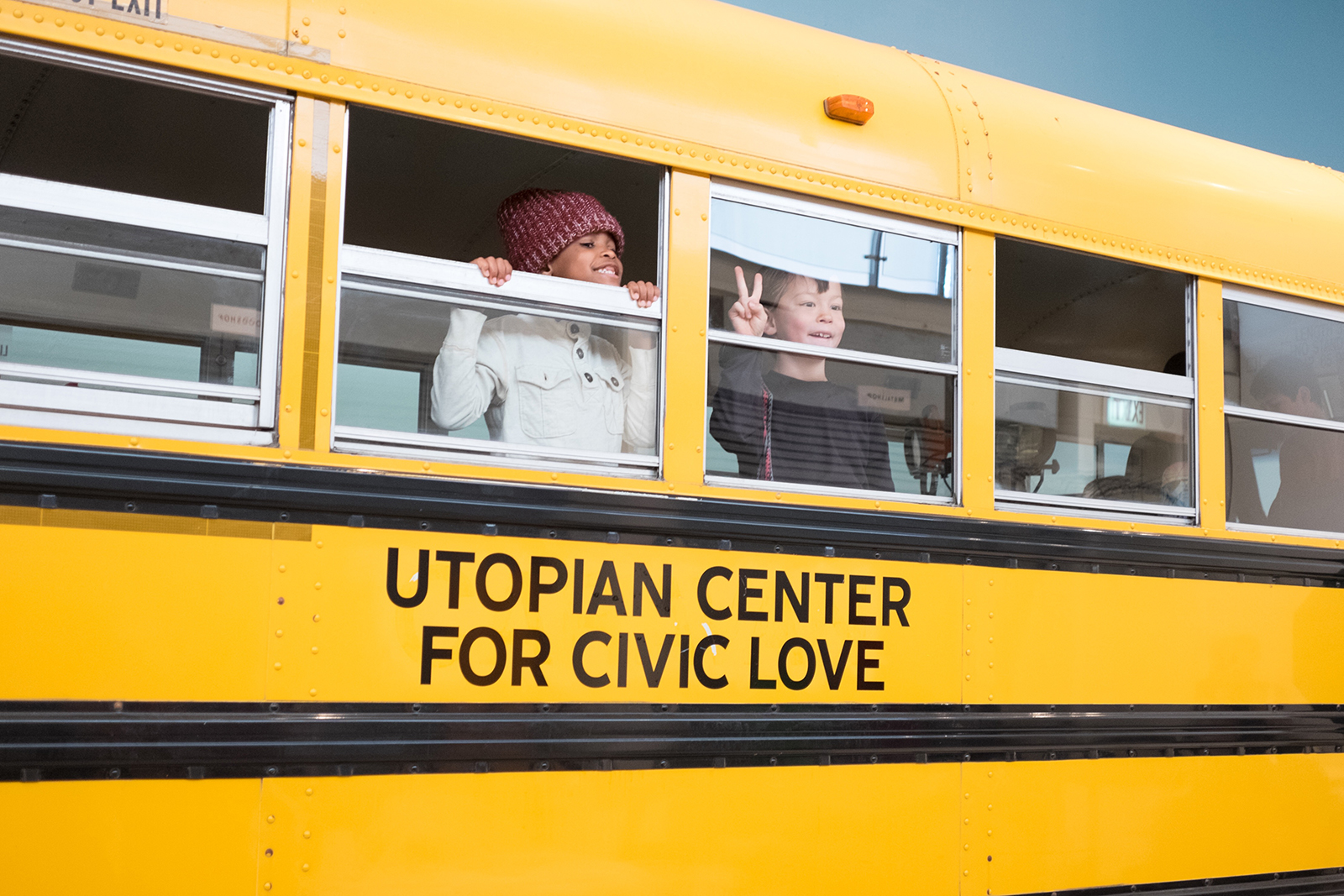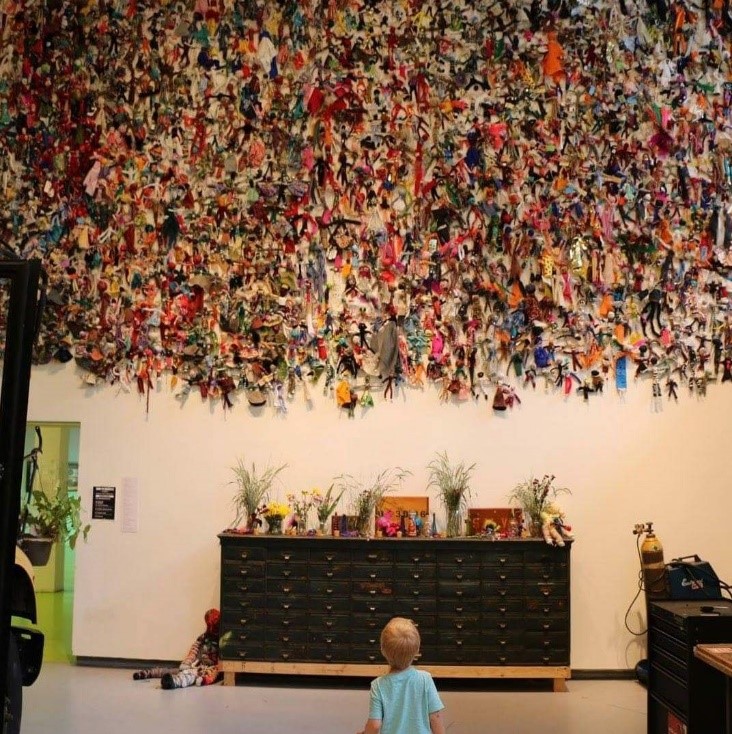 Artist and DePaul faculty member Jim Duignan founded the Stockyard Institute to respond to needs, questions, and hopes of the youth, radical teachers and local activists throughout Chicago. "Stockyard Institute, 1995-2000. Gang-Proof Suit." (Image courtesy of Jim Duignan)
Artist and DePaul faculty member Jim Duignan founded the Stockyard Institute to respond to needs, questions, and hopes of the youth, radical teachers and local activists throughout Chicago. "Stockyard Institute, 1995-2000. Gang-Proof Suit." (Image courtesy of Jim Duignan)CHICAGO — This fall a pair of complementary exhibitions at DePaul Art Museum will highlight the rich exchanges among Chicago’s communities, artists and educators. “Stockyard Institute: 25 Years of Art and Radical Pedagogy” is the first retrospective of work by social practice artist and DePaul University faculty member Jim Duignan. At the same time, “Learned Objects” will bring together studio works by four Chicago-based artists and educators: William Estrada, Regin Igloria, Nicole Marroquin and Rochele Royster. The exhibitions open Sept. 9, 2021, and run through Feb. 13, 2022.
“Both of these exhibitions are a call to action for visitors to consider the anxiety, anger, fear, and exclusion you may experience — particularly as a young person,” said Laura-Caroline de Lara, interim director of DePaul Art Museum. “We invite visitors to experiment with alternative methods of tangible, creative problem-solving that can lead to a greater love and care for yourself, your neighbors and your city.”
‘Stockyard Institute: 25 Years of Art and Radical Pedagogy’
In 1995, artist Jim Duignan founded the Stockyard Institute, an ongoing civic and artistic practice using grassroots community organizing to collectively respond to needs, questions, and hopes of the youth, radical teachers, and local activists throughout Chicago.
“Cultural organizations across the country are currently re-evaluating our approaches for how we engage and build relationships with the communities that we serve,” said de Lara. “Jim Duignan’s methods for developing projects within Chicago’s neighborhoods and with citizens of all ages is an exemplary illustration of what we as cultural change-makers should all be striving for in our own work.”
Duignan is an associate professor in DePaul’s College of Education, and the Stockyard Institute views arts and educational institutions as artistic material and students as creative equals. He founded and chairs the Secondary Education Visual Arts program at DePaul, which allows students to obtain their teaching license via untraditional coursework including Duignan’s class “Teacher as Artist.”
In this first retrospective of Duignan’s work, DePaul Art Museum brings together archival material, objects, installations and a radio station. Other projects documented in the museum exhibition include a tourist bureau for Chicago’s Austin neighborhood with longtime collaborator Davion Mathews and proposals compiled from students across the city for how to repurpose abandoned schools.
The exhibition was co-organized by Julie Rodrigues Widholm, director of the UC Berkeley Art Museum and Pacific Film Archive; and Rachel L.S. Harper, professional lecturer in DePaul’s College of Education. The Andy Warhol Foundation for the Visual Arts provided support for this exhibition.
‘Learned Objects’
Like Duignan, all four artists in the exhibition “Learned Objects” are seasoned activists, educators and pillars of their local communities. They have developed socially engaged practices alongside equally robust studio practices — from the classroom, to city streets, and back to the artist’s studio.
“Seen in this light, a ‘learned’ object is both a material and conceptual site of encounters between social relations, lived experience and community history,” said Harper, guest curator of the exhibition.
William Estrada’s ongoing project “Portraits of Resolution” is a series of photographs taken in front of the Cook County Courthouse. The artist set up a mobile photography studio and encouraged curious passersby — many of whom were coming to and from court — to pose for portraits behind a chalkboard-like backdrop.
Regin Igloria, founder of the community arts space North Branch Projects, creates handmade sketchbooks and sculptural objects that negotiate the movement of bodies of color through urban space and the natural world in an effort to challenge the romantic notions of nature. An avid runner and cyclist, Igloria’s work often reimagines the equipment associated with endurance sports.
 "Rochele Royster, 2015-2020." (Image courtesy of the artist. Photo by Nick Hostert)
"Rochele Royster, 2015-2020." (Image courtesy of the artist. Photo by Nick Hostert)For Pilsen-based artist Nicole Marroquin, the very process of shaping and firing ceramics is itself a political gesture that functions as a means of preserving and asserting existence. These works reveal symbolic harmonies with Marroquin’s more public-facing projects, which include researching the history of artistic and political movements by Latinx youth in Chicago, and shaping public schooling as an activist teacher of teachers.
A Chicago Public School teacher for nearly 20 years, Rochele Royster’s extensive background in art therapy informs both her holistic pedagogical practice and her community-based art projects. “Dolls 4 Peace” invited children, teachers, and community members across Chicago to create handmade dolls as a means for addressing trauma and gun violence. The more than 1,500 dolls form a monument-like tapestry that reveals the intimate way in which structural violence affects the youngest members of our city’s communities.
DePaul Art Museum is located at 935 W. Fullerton Ave. on DePaul’s Lincoln Park Campus. Admission is always free. Hours and additional information is online at
http://artmuseum.depaul.edu or by calling 773-325-7506.
###
Source:
Laura-Caroline de Lara
laura-caroline.johnson@depaul.edu
Media contact:
Kristin Claes Mathews
kristin.mathews@depaul.edu
312-362-7735